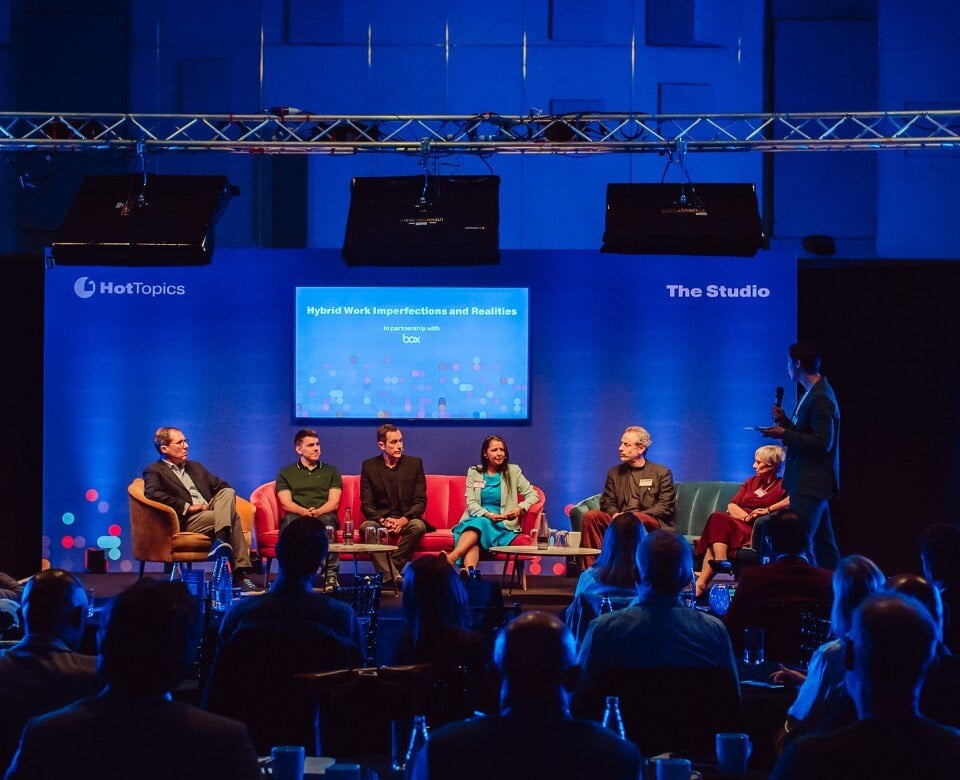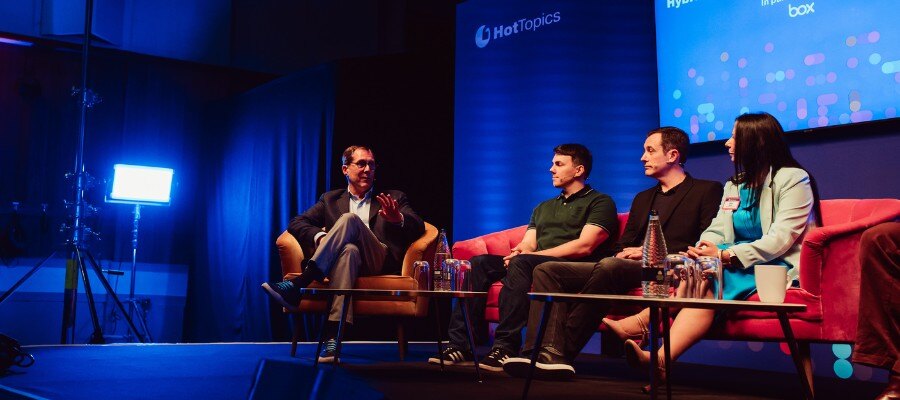
Industry leaders delved into the hybrid work imperfections and realities of balancing flexibility, collaboration and security in this HotTopics roundtable debate.
The amalgamation of in-person and remote work has resulted in the adoption of hybrid work policies, designed to encourage staff flexibility and widen talent accessibility while fostering collaboration and company culture.
With improved flexibility and collaboration has, however, come some difficulty. Culturally, hybrid work represents an uneven playing field of opportunities and risks for employees and employers, while hybrid environments have introduced new security vulnerabilities, regulatory complexities and heightened concerns over data protection and data residency.
Technology executives must therefore balance innovation with risk mitigation, prioritising organisational resilience and employee wellbeing.
With HotTopics’ Editor Peter Stojanovic moderating, the panellists included:
- Omar Davison, Staff Solutions Engineer, Box
- Leonor Diaz Alcantara, Former CEO, Montessori Global Education
- Lee Fulmer, Chairman, Finance Advisory Board, OpenUK
- Rubi Kaur, Chief Enterprise Architect, Lloyds Banking Group
- Chris Fry, Global Transformation Director, Dentsu
- Professor Carl Gombrich, Dean, London Interdisciplinary School
Hybrid work imperfections: Overview
- Current perceptions of hybrid work imperfections
- Hybrid work in the education sector
- Hybrid work imperfections: the key question

Current perceptions of hybrid work imperfections
“It’s just the reality now.”
For many organisations, hybrid work is not just a temporary solution but a well-integrated aspect of their workplace culture. Chris Fry, Global Transformation Director at Dentsu, noted that his organisation had embarked on the hybrid work journey even before the pandemic, with a strategic plan to implement it gradually. The pandemic accelerated this transition, pushing them to adapt quickly and efficiently.
However, the hybrid work model is not without its challenges. At Lloyds Banking Group, Chief Enterprise Architect Rubi Kaur explained that there is a quasi-hybrid model in place, requiring employees to be in the office two days a week. The policy was met with mixed reactions, especially from an older workforce that had become accustomed to working from home during the pandemic. Alongside this, the organisation was also dealing with the complexities of supporting a younger, entry-level workforce.
“But I think with collaboration with the way we work and the agile methodology, it forces us to work together. The tools are getting better, the modern workplace that we’re putting together is getting better.” Rubi added that culture plays a significant role in the success of hybrid work. She emphasised the importance of fostering a supportive environment where employees feel that they are not alone in this new model.
On the opposite side of the spectrum, Lee Fulmer, on the Finance Advisory Board at OpenUK, argued that his perceptions of hybrid work have radically changed: “Everything is remote and everything is collaborative and hybrid… that's been a culture shock for me.” Having spent the last 12 years in investment banking, Lee explained that they had been hybrid for over a decade, working flexibly from different offices and locations.
“The backlash in banking has actually been driven by regulatory oversight and having people back in again.” When working with financial institutions, the main challenge for Lee is keeping the balance intact, especially since the younger workforce want more flexibility with the option to come into the office and socialise with the rest of the team.
Hybrid work in the education sector
Education also plays a critical role in shaping the future workforce’s perception of hybrid work.
Leonor Alcantara Diaz, Former CEO at Montessori Global Education, argued that the pandemic highlighted the shortcomings of online learning and teaching, with many students and parents expressing dissatisfaction with the lack of interaction and meaningful engagement.
On the other hand: “We had actually had a virtual learning environment way before the pandemic so we were doing teacher training across 92 countries and it was a very helpful way of bringing the community together.” The key is to balance technological opportunities with the need for human connection, ensuring that students develop the necessary social skills.
Higher education institutions are also grappling with the realities of hybrid work. “Higher education is really confused at the moment.” Professor Carl Gombrich, Dean at the London Interdisciplinary School, argued that attendance has significantly decreased and students are confused about the value of in-person learning versus online.
While group projects and teamwork have adapted well to hybrid formats, the challenge remains to provide a meaningful university experience that prepares students for a hybrid work environment:
“Two will be in a cafe, three will be on campus, one will be in another country, even though we're not supposed to allow that, but they keep taking holidays and they say, I'm doing my work in Malaga on the beach, why can't I be, even if it's term time?” The emphasis on building networks and relationships is crucial — Professor Gombrich believes these skills are essential for tackling real world problems.
Hybrid work imperfections: The key question
The panellists were all in agreement that the business world must adapt to these changes. Effective hybrid meetings require careful consideration of power dynamics and communication strategies.
“If you have a majority of virtual and then three people in a room often just sort watch it as if it was a movie unfolding in front of them, like a podcast.”
Omar Davison, Staff Solutions Engineer at Box, suggested that meeting leaders should start with the minority group—those joining remotely—to ensure their voices are heard and valued. In his view, this approach can help balance the conversation and ensure that all participants feel included and engaged.
“So how do we now take that and from a psychological perspective, from a learning perspective, introduce new cultural phenomenons and dynamics to impact it all to get the best efficiency?”
If you enjoyed reading about the ‘Hybrid Work Imperfections and Realities’ roundtable, discover more related articles in our C-Suite Insights.
This roundtable was created in partnership with Box.
SUBMIT A COMMENT
RELATED ARTICLES
Join the community
To join the HotTopics Community and gain access to our exclusive content, events and networking opportunities simply fill in the form below.

